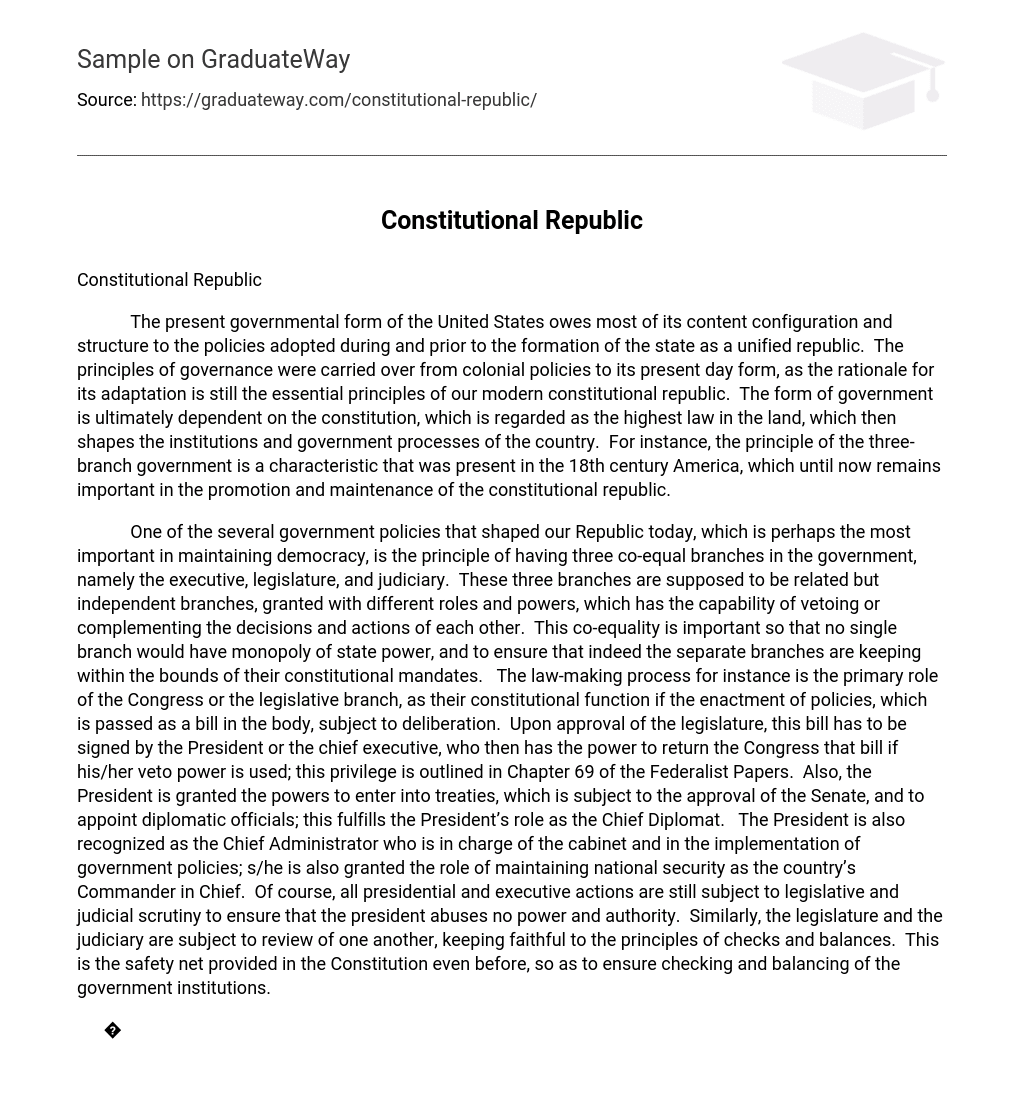The present governmental form of the United States owes most of its content configuration and structure to the policies adopted during and prior to the formation of the state as a unified republic. The principles of governance were carried over from colonial policies to its present day form, as the rationale for its adaptation is still the essential principles of our modern constitutional republic. The form of government is ultimately dependent on the constitution, which is regarded as the highest law in the land, which then shapes the institutions and government processes of the country. For instance, the principle of the three-branch government is a characteristic that was present in the 18th century America, which until now remains important in the promotion and maintenance of the constitutional republic.
One of the several government policies that shaped our Republic today, which is perhaps the most important in maintaining democracy, is the principle of having three co-equal branches in the government, namely the executive, legislature, and judiciary. These three branches are supposed to be related but independent branches, granted with different roles and powers, which has the capability of vetoing or complementing the decisions and actions of each other. This co-equality is important so that no single branch would have monopoly of state power, and to ensure that indeed the separate branches are keeping within the bounds of their constitutional mandates. The law-making process for instance is the primary role of the Congress or the legislative branch, as their constitutional function if the enactment of policies, which is passed as a bill in the body, subject to deliberation. Upon approval of the legislature, this bill has to be signed by the President or the chief executive, who then has the power to return the Congress that bill if his/her veto power is used; this privilege is outlined in Chapter 69 of the Federalist Papers. Also, the President is granted the powers to enter into treaties, which is subject to the approval of the Senate, and to appoint diplomatic officials; this fulfills the President’s role as the Chief Diplomat. The President is also recognized as the Chief Administrator who is in charge of the cabinet and in the implementation of government policies; s/he is also granted the role of maintaining national security as the country’s Commander in Chief. Of course, all presidential and executive actions are still subject to legislative and judicial scrutiny to ensure that the president abuses no power and authority. Similarly, the legislature and the judiciary are subject to review of one another, keeping faithful to the principles of checks and balances. This is the safety net provided in the Constitution even before, so as to ensure checking and balancing of the government institutions.
In terms of the power of the judiciary, this branch is given the task of judicial review in order to ensure that all government actions are not in conflict with the provisions of the constitution. The branch also acts as the final arbiter in decision in cases of constitutional importance, or even conflict resolution among individuals, groups, or institutions. The legislature, on the other hand, has the power to approve appoints and to approve the national budget. The Congress, which is composed of the House of Representatives and the Senate, are also given the task to evaluate actions of the Executive, through legislative investigations or if necessary, even impeachment.
Another important policy adopted before the formation of the Republic is concept and process of taxation, which essentially defined and realized property rights and individual contribution to collective interests, which would be government by the constitutional state.
The policies that were agreed upon by the colonies is important in order to secure the community that they had sought to unify. As stated in Chapter 2 of the Federalist Papers, they are separate territories whose goal of security and principles of society is similar. Therefore, the principles of government – taxation, checks-and-balances – that existed before is adopted until now, as it strengthens the democratic-ness of the Constitutional Republic.
References
Danziger, James. (2005). Understanding the Political World: A Comparative Introduction to Political Science, 7th Ed. United States: Addison-Wesley Longman.
Magstadt, Thomas. (2006). Understanding Poltiics: Ideas, Institutions, & Issues, 7th Ed. USA: Thomson Wadsworth.
The Library of Congress. “Federalist Papers”. <http://thomas.loc.gov/home/histdox/fedpapers.html> Accessed 21 January 2008





